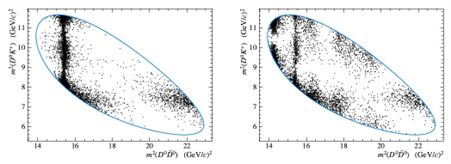
Congratulations to Ho Sang Lee, who was awarded the 2024 Leo Carrol Prize at this year’s annual Liverpool Particle Physics Group Meeting. The prize itself was awarded for the quality of the first-year report and performance in the first-year viva. The report is entitled “Study of the effects of correlated D0 anti-D0 systems in Dalitz plot analyses”, describing a preliminary investigation leveraging entanglement to improve hadron spectroscopy and searches for new particle resonances.
Ho Sang is now embarking on his thesis project, which develops a framework to harness entangled charm meson systems from χc1(3872) exotic meson decays. This will eventually provide a source of data to explore time-reversal symmetry in the charm quark system, along with input for measurements of matter-antimatter asymmetry in the beauty quark system. Driving this work, Ho Sang is the LHCb Quarkonia Working Group Trigger Liaison for double-Charm spectroscopy.
Ho Sang’s PhD advisors are Paras Naik, David Hutchcroft, and Tara Shears.
Figure: Simulation of B+→ D0 anti-D0 K+ decays on 2D invariant mass-squared (“Dalitz”) plots, based on a plausible model informed by other decays. When both D mesons are reconstructed in eigenstates of charge-parity (CP) symmetry, a selection rule forbids (enhances) intermediate resonances with charge symmetry C = −1 (+1) decaying to D0 anti-D0 [left]. When both D mesons are reconstructed in quark-flavor eigenstates, the production of such resonant states is unaffected [right]. Resonances decaying to D0 anti-D0 appear as vertical bands on the plots. The [left] process occurs in nature approximately 50 times less frequently than the [right] process. Ho Sang demonstrated that even with the suppressed rate of the [left] process, each event yields discerning additional constraints on resonance parameters, due to the selection rule.
